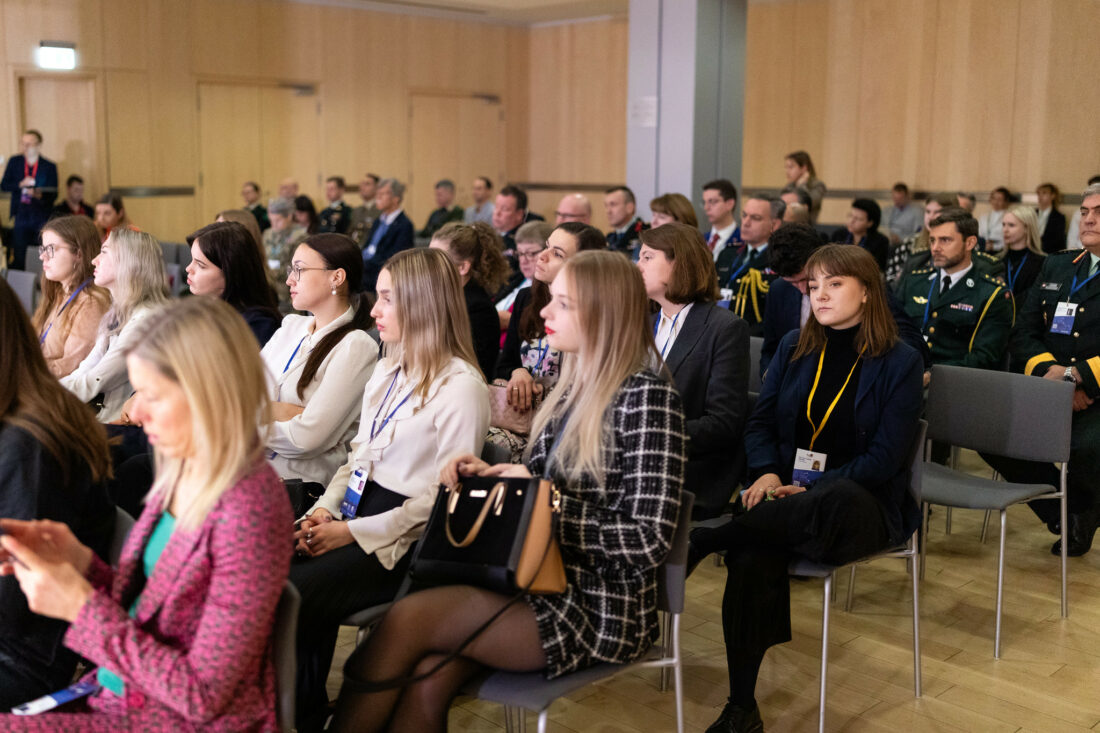The Rīga Conference Future Leaders Forum 2023
Future Leaders Forum (FLF) is an important part of The Rīga Conference that takes place annually just before the Conference. It is one of the key side events of the Conference and is aimed at young professionals, under 35 years old, with interest in international relations, defence and security. It is a unique opportunity for the participants to network and debate issues of interest with peers, policy makers, academics, and opinion leaders. Future Leaders Forum 2023 took place on 18 and 19 October 2023 and was hosted by Konrad Adenauer Stiftung Office Baltic States and NATO Public Diplomacy Division.
For the second year the FLF took place in a hybrid format blending traditional in-person meetings with remote streamlined interactions among speakers and participants from different counties.
This year 16 participants from 14 countries had an opportunity to take part in the Forum in person, while around 10 were able to join online, some of whom were students from Ukraine. The participants came from different professional backgrounds bringing diversity of experiences, including youth organizations, public sector, non-governmental sector, universities, think tanks, military.
One and a half day programme of the FLF included four discussion panels and two interactive activities – a workshop and a simulation exercise.
- The first discussion panel focused on adaptive leadership during which emerging leaders shared their views on what constitutes good leadership, when there are no easy answers to challenges our society faces, requires an adaptive approach to tackle wicked problems. In this panel, the panel and the wider group discussed the diverse nature of challenges to international stability and security and the kind of leadership needed to navigate them. Emerging leaders shared their views on the leadership needed in these times of change to help shape a sustainable rules-based global order.
- The second discussion panel focused on issues related to sustaining a rules-based global order. Field experts and FLF participants discussed the requirements for a functioning international order as a foundation on which long-term economic, social and cultural prosperity across the globe is sustained. Different perspectives on how this can be achieved were discussed, all pointing to the need for a comprehensive perspective on security and a systemic approach to producing resilience.
- The third discussion panel, building on the previous session, explored how issues related to strengthening Trans-Atlantic relationships to foster global security, particularly as the nature of threats continue to evolve. Participants explored how NATO, the EU, and individual member-states, need to adapt to be able to remain at the cutting edge of innovation and be able to respond effectively to the diverse nature of challenges and evolving threats to make a meaningful contribution to building a secure and resilient global order.
- The final panel discussed the war in Ukraine with the particular focus on the pathway to peace. Participants discussed the impact of the war and what we can learn from it to make a positive change, from post-war reconstruction to strengthening wider security in Europe. All in all, this active participation in the programme offered an opportunity to young professionals to extend their experience and gain new skills.
In addition to the discussion panels, participants were able to engage in half a day simulation exercise/wargame “Echoes of Influence: Memetic Warfare in the Global South”. This game was designed to encourage strategic thinking, careful resource management, and a creative approach to geopolitical competition. It immersed participants in the unpredictable nature of information warfare, where narratives can suddenly change, and public sentiment can be volatile. As part of the second day programme, FLF participants engaged in #PreBunkers workshop designed by the Atlantic Forum Academy based on the “Bad News Game”, an educational browser game designed by ‘DROG’ and Cambridge University. It uses declassified material on resilience from NATO’s CIMIC Centre of Excellence and NATO doctrine on Information Operations.
During the FLF and The Riga Conference, the participants also had an opportunity to have scheduled meetings with Ambassador Baiba Braže, Ambassador for Special Assignments, Ministry of Foreign Affairs of the Republic of Latvia (and former NATO Assistant Secretary General for Public Diplomacy) and with Mr David Cattler, NATO Assistant Secretary General for Intelligence and Security.
“..I believe the content and discussions were excellent with a number of very interesting guests. I met a lot of interesting people, first and foremost my colleagues at the FLF – it was a great opportunity at a personal level. So thank you very much for this opportunity. I enjoyed and benefitted a lot from it” (Romain Le Quiniou)
“…Recently I received the honour to represent the voice of Ukrainian civil society … at the 2023 Future Leaders Forum… It was an enormous pleasure to participate in a panel discussion together with brilliant speakers… Besides the speaker participation, I had a great inspiring time with impressive young professionals…” (Bohdanna Duma)
“I was honoured to be part of the annual The Riga Conference 2023 and the Future Leaders Forum 2023. My highlight was being on the panel discussion about “Strengthening Trans-Atlantic Relationships to Foster Global Security”. Massive thank you for providing me with the incredible opportunity”. (Ben Bruecher)



